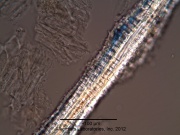Frangula purshiana (bark)
(→add category divisions and wikipedia references) |
|||
| Line 11: | Line 11: | ||
=Macroscopic Entries= | =Macroscopic Entries= | ||
=Microscopic Entries= | =Microscopic Entries= | ||
| − | {{ | + | {{Microscopy | source=Elan M. Sudberg, Alkemist Laboratories-British Pharmacopoeia, 2011 |
| − | | description=Cascara | + | | companyimage= AP-LOGO-Laboratories Crop - Copy.jpg |
| + | | companyURL=http://www.Alkemist.com | ||
| + | | mainimage=Cascara.jpg | ||
| + | | caption1=Fibers showing calcium oxalate prism sheath observed at 400x with Acidified Chloral Hydrate Glycerol Solution. | ||
| + | | description= Cascara (bark) (''Rhamnus purshiana'') | ||
| + | | image2=Cascara-1.jpg | ||
| + | | caption2=Medullary ray in cross section observed at 400x with Acidified Chloral Hydrate Glycerol Solution. | ||
| + | | characteristics=cellular structures identified in this botanical specimen are the fibers showing calcium oxalate prism sheath and the medullary ray in cross section. when observed at 400x with Acidified Chloral Hydrate Glycerol Solution. | ||
| + | | }} | ||
| + | |||
}} | }} | ||
=HPTLC Entries= | =HPTLC Entries= | ||
=Other Points of Interest= | =Other Points of Interest= | ||
Revision as of 14:11, 21 September 2012
Contents |
Introduction
Introduction from Wikipedia, the free encyclopedia (http://en.wikipedia.org/wiki/Rhamnus_purshiana, retrieved 02/27/2012).
Rhamnus purshiana (Cascara Buckthorn, Cascara, Bearberry, and in the Chinook Jargon, Chittam or Chitticum; syn. Frangula purshiana, Rhamnus purshianus) is a species of buckthorn native to western North America from southern British Columbia south to central California, and inland to western Montana.
It is the largest species of buckthorn, occasionally growing up to 15 m tall, though more commonly a large shrub or small tree 5–10 m tall, with a trunk 20–50 cm in diameter. The bark is brownish to silver-grey with light splotching. The leaves are deciduous, alternate, clustered near the ends of twigs; they are oval, 5–15 cm long and 2–5 cm broad with a 0.6–2 cm petiole, dark shiny green on top, fuzzy and paler green below. The flowers are tiny, 4–5 mm diameter, with five greenish yellow petals; the flowering season is brief, disappearing by early summer. The fruit is a berry 6–10 mm diameter, bright red at first, quickly maturing deep purple or black, and containing three seeds.
It grows in moist, acidic soils in the shady side of clearings or in the marginal forest understory, near the edges of mixed deciduous-coniferous forests. It typically grows as a second-generation tree after alders have colonized a barren plot of land.
The quoted text in this section was licensed for use under the Creative Commons ShareAlike License, version 3.0: http://creativecommons.org/licenses/by-sa/3.0/
Macroscopic Entries
Microscopic Entries
|
}}
HPTLC Entries
Other Points of Interest
Cite error: <ref> tags exist, but no <references/> tag was found

